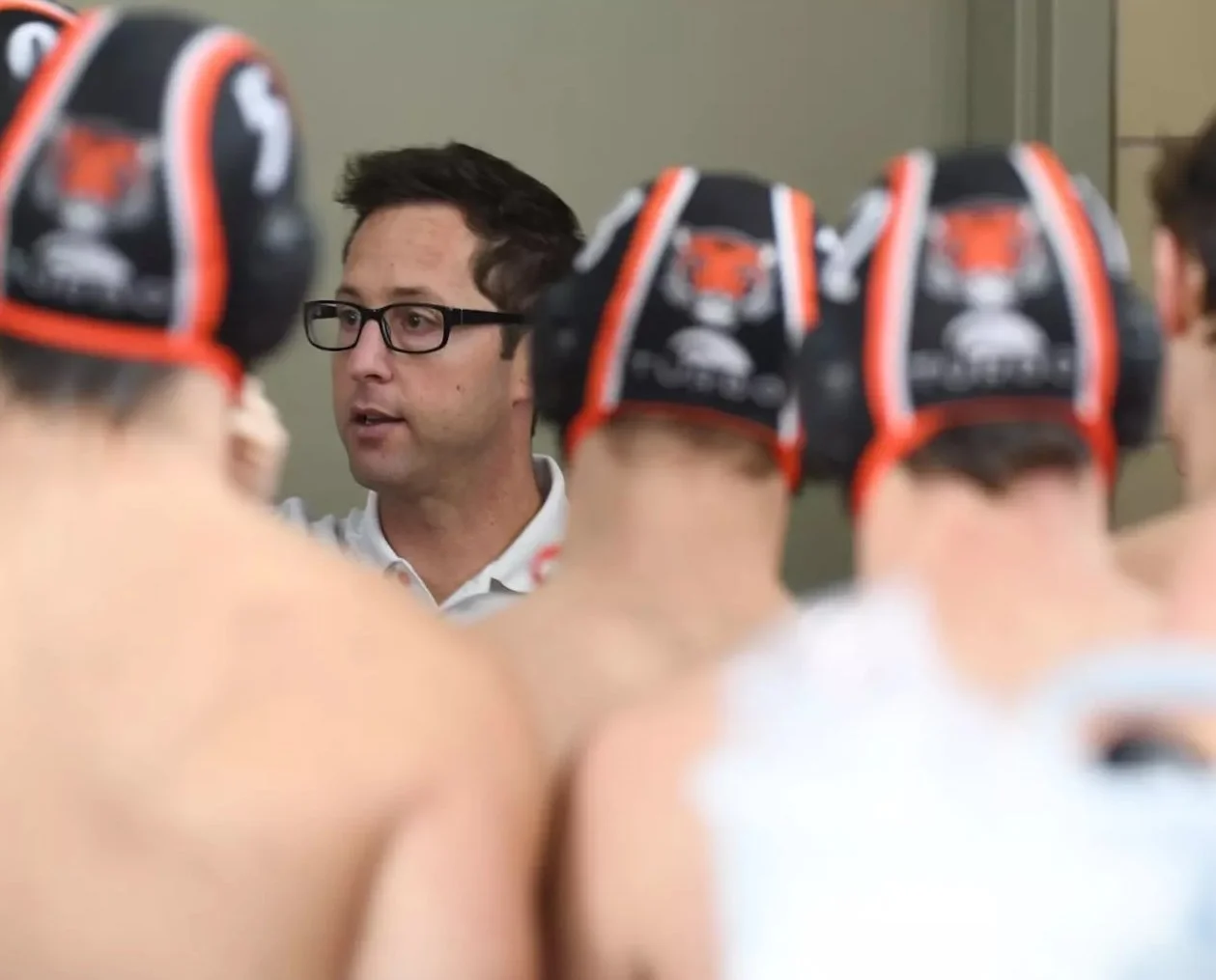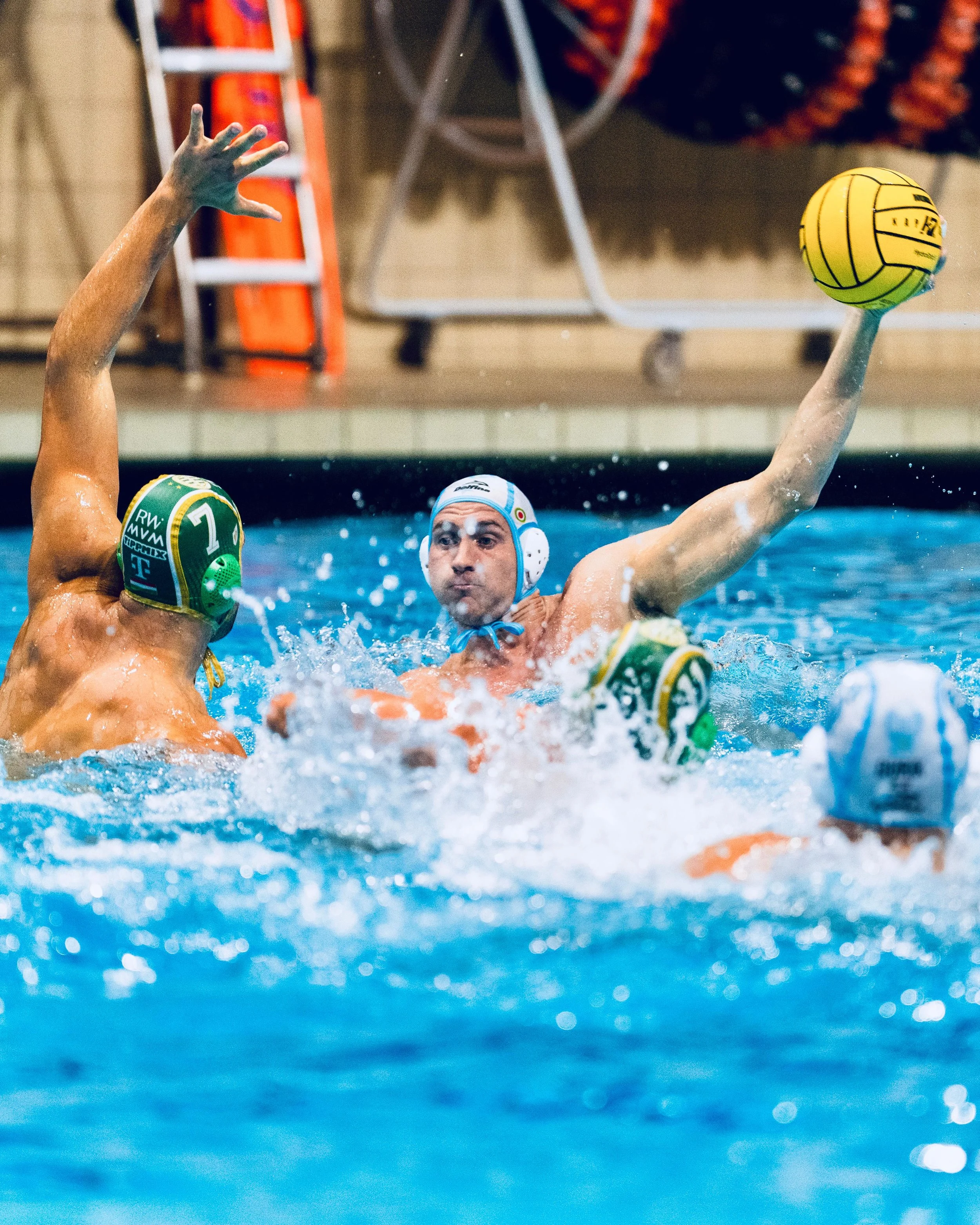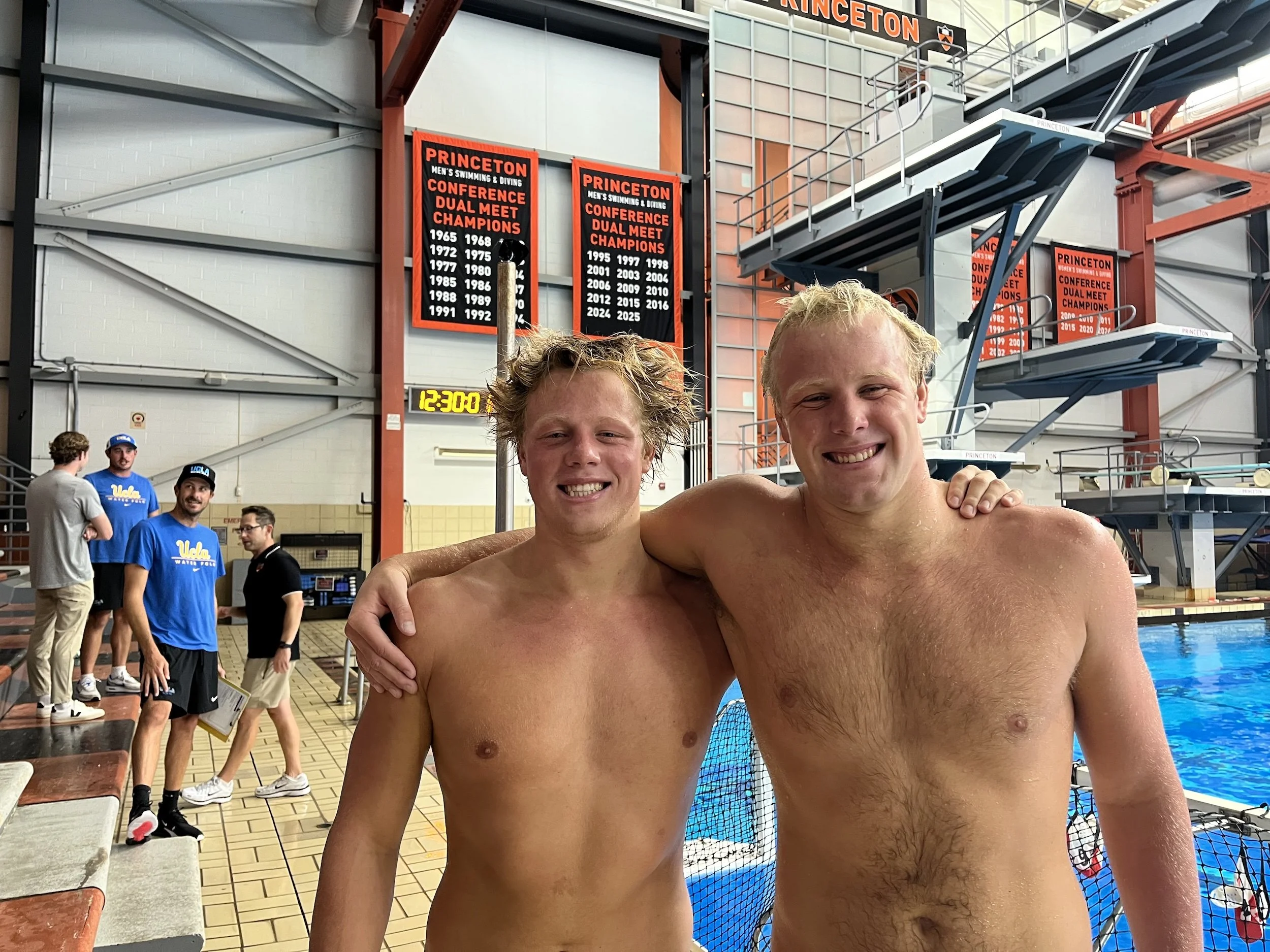On The Record: Princeton’s Dustin Litvak
Princeton Head Coach Dustin Litvak. Photo: Princeton Athletics
If one were to identify the leading voice for American youth and collegiate water polo, Dustin Litvak would be a great choice. A former assistant to Adam Wright, UCLA men’s and women’s coach, for the past seven seasons Litvak has led the Princeton men’s team while assisting Tiger women’s coach Derek Ellingson during their season.
In compiling a 153-62 record (.712 winning %) at Princeton, Litvak’s teams have qualified for five NCAA tournaments while capturing five Northeast Water Polo Conference titles. His success due to extensive preparation, pragmatism and a willingness to play any opponent any time to advance his team’s development.
One of the founders of the Futures Water Polo League and current league commissioner, Litvak has created the country’s best age group polo league. In the process Futures Water Polo has supplanted USA Water Polo’s Junior Olympics as the premier tournament for elite youth water polo competition.
These accomplishments have anointed the 40-something Litvak as the one to lead the sport forward. That he makes his home in the Northeast marks an important development for polo’s growth in the country’s most populous region.
This interview has been edited for brevity and clarity
***
In early September the Princeton men joined UCLA and professional clubs Pro Recco and Ferencvaros for a two-day tournament at New York City’s Asphalt Green pool. Princeton alum Phillip Hammarskjold, a co-owner of Pro Recco, coordinated with Litvak and Tiger water polo to make this unprecedented event possible.
- This is—historic is perhaps the wrong term—a big deal. How do you feel that Princeton is the generator of all this great activity?
Yeah, it's incredible. It's so important and this is just the beginning. There needs to be more events like this. Everybody's learning as we go, so we keep getting better. Thanks to Asphalt Green and everybody who put this on because it wouldn't happen without them.
[A Huge Opportunity for New York City Polo. Will We Blow It?]
Of course we’re grateful to be here, but we didn't want our attitude coming in [to be] “Just happy to be here.” We want to compete, we want to get better, and you only get better by playing [teams] better than you.
Pro Recco vs. UCLA in the pool at Asphalt Green in September. Photo: M. Randazzo
And there's no one better in the world right now than [Ferencvaros].
- Interesting because the Pro Recco vs. UCLA match was: “We're here and we're having a nice time.” Then your team plays Ferencvaros and there’s nothing friendly about it.
I was happy that [Ferencvaros] didn't take it easy on us. They were flying down the pool and going after us. At no point did I feel like they were going to pull back… and that's what we wanted. We don't want any mercy. We want to play.
[Pros Vs. College Kids A Warm-Up for Pro Recco / Ferencvaros]
I mean what UCLA did was obviously impressive. They're a great team. They have a couple Olympians on their roster. They've been training all summer. We've been back for two weeks.
- Yet your goal is the same as UCLA’s: make it to NCAAs, go deep in the tournament.
A hundred percent. But that's December. I'm talking about early September. We know that we can get better. We can grow more than any other team because we don't train in the summer.
Pro Recco vs. Ferencvaros on September 4 at Asphalt Green. Photo: Sergio Mena Funcia
We can grow faster and we can grow more by the end of the year just because of where we start. They've been going [all summer]. A lot of their growth has already happened—I'm not saying they're not going to continue to get better. Of course they are. But I feel we are just learning about our new players. [UCLA has] had their new players with them all summer, trying to incorporate new pieces, different combinations.
Our goal is to be there again in November and December. We want to set up the toughest schedule to test us. That's why we're the only team playing both Recco and FTC. No one else is doing that.
- You chose to play both professional teams...
And other teams chose not to. The only way to get better is to play against teams that are better than you, learn from the video and learn from the experience. I was so happy with the way our guys battled and never backed down.
- In 2005, Asphalt Green hosted the Hungarian and USA men’s teams here. No one remembers that. In 2002, Pro Recco was here. Only Mark Koganov remembers that—it’s not even in the AG records. How does this event avoid being a one-off that might happen again in two decades?
You have to build off the momentum. Obviously, the right people must be involved [because] it's a big undertaking. I don't know how those [events] were operated, so I can't comment on what happened in the past or maybe how it stopped happening.
[Asphalt Green’s David Rodriguez: The Time is NOW for AG Water Polo]
Princeton and Recco players at Princeton
But I can tell you that the people involved, the people that Phillip [Hammarskjold] brought on board have been top notch. It's a learning experience; Asphalt Green didn't even have a water polo set up before this.
I can tell you too, having Recco and FTC on our campus, they've been in awe with what college looks like. And I think with Team USA doing well at the senior level, at the junior level, UCLA, being competitive, all of these things, even FTC commenting on how good they thought we were in training this week watching us… it's going to convince the Europeans that there's good American water polo —and we have to build this connection.
[Ferencvaros Coach Balazs Nyeki: “We Want to be the Best”]
There's times in the past where European teams have come and they've treated this as a vacation. Now I think it's different. These teams are going back and to play in important games [in Europe]. They can't treat this [like] it's a day at the beach.
***
On September 27—after traveling the previous weekend to Los Angeles for the MPSF Invite, a trip Princeton has taken the past three year—the Tigers came to New York City for a match against Fordham at their intimate aquatic facility in the Bronx. Last year, an 11-7 win by the Rams over the Tigers fueled Fordham’s rise as darlings of US water polo. Their undefeated season ended in an electric overtime loss to USC in the NCAA semifinals has cemented Fordham as the team to beat from the East.
[At Fordham, Where Lombardi Once Ruled, Water Polo is Now King]
Despite racing out to an early lead, Litvak’s team ran out of gas in the third period as the host Rams, buoyed by a rabid fanbase of students, exploded for six goals in a highly entertaining 19-16 win. The Princeton coach spoke after the match about how the long arc of a season matched against the best US teams will result in success for his Tigers.
- It was an exciting match and just for perspective, this is the campus of Vince Lombardi. Just for today, Fordham water polo topped Fordham football.
Kudos to Brian and his staff, they do a great job here. We need this on the East Coast. It's a great environment for 10:30 a.m. Who knows how late these [Fordham] kids were out last night? For them to show up and have that kind of energy in the stands… that's awesome.
- This game is a yardstick before your team goes into conference play.
Fordham fans at Princeton / Fordham on September 27. Photo: M. Randazzo
Our yardstick is ourselves right now. We took some bumps on the West Coast but played good teams. Obviously our defense needs a lot of work, and what better place to test your defense than Fordham?
At times we looked good defensively and really organized, but their counterattack was too much and our turnovers led to that.
For us it's just about trying to get better. We came out stronger than we came out last weekend in almost any game. We did a lot of things well today, but we also struggled. We have to go to work and improve and for us, that's about late November and trying to get back into the tournament.
- When Princeton played Fordham last year, you had just returned from California. You said at that time you didn't feel like your team was ready. Today it looked like your guys came to play.
There's a lot of factors there. I think last year, coach's mistake, we drove up on a Friday night, took us three hours on the bus and played that night. That's not smart, right after the MPSF invites, you're getting Monday off three days training and then a three hour bus ride. This time we came up last night and played in the morning. That helped a lot.
Last year there was a lot of pressure on us. We were still the favorite at that point. We had just played UCLA to overtime. This year the pressure is on them. No matter what, I was impressed by the way our guys came out. They were super fired up. I thought we did a lot of great things and even though we made some mistakes, we got better and more consistent.
So, I feel better about this game than last year. And the score doesn't matter; when you're going seven on six at the end or the goalie is out, it doesn't matter if it's 11-7 or 11-10.
- You talk about pressure. You are at an Ivy League institution; for kids who go to Princeton, Harvard, Brown, athletic outcomes aren't usually the benchmark You want to be the best, so you constantly play the best. How does that square with the culture of one of the world’s top academic institutions?
You recruit kids that are used to it. We’ve got guys coming from some of the top high schools—international and domestic—that want to be the best at everything. And they understand that you're going to get a lot more freedom in the off season. You're going to get a ton of freedom in the summer,
Litvak at work in his office: the De Nunzio pool deck. Photo: Princeton Athletics
But we're in season, we're serious about what we're doing. Last year we had I think 22 or 23 Academic All-Americans. So, it's not like school's an afterthought. That's one of the things I appreciate about the Ivy League model; we're getting guys here that understand there's more to life than water polo. They want to put themselves in a great position for whatever they want to do in life once when school ends. But at the same time, they're hyper competitive. They played for excellent high schools, excellent clubs and they know, there are a lot of sports on our campus that are competitive on a national level. As a whole, Princeton does a great job with the athletic experience.
There's no question academics are what they are in the Ivy League, [Princeton is] the number one school in the world. But I feel like we have everything that the Power Four conferences have in terms of what we can give them.
We don't have offseason training. Grad students can't play. There's no red shirt here. You can't transfer into Princeton and play sports. There's a lot of things that hamstring us, but at the same time, our guys are so resilient, and they practice so hard in season and they understand, hey, we're going to commit to this and then it's not going to take away from everything else we want to do.
It's more of a buy-in because I'm not asking them to sacrifice everything for water polo. In college sports these days you are sacrificing everything for your sport. I think they understand that's not the case here.
- One example is Stanford, which combines academic and athletic success.
That's a different model. They train in the summer. [Graduate] students can play there. West Temkin (former Tiger goalie) transferred to Stanford. They get eight guys a year; we get three. You're right, in terms of academics and athletics, absolutely, Stanford's done a great job. But it's not apples to apples.
- Bringing in foreign-born players is a trend that's been going on for decades—but now you see more foreigners than ever in collegiate water polo. When I spoke to UCLA’s Chase Dodd, he said it's great that Fordham can bring in foreign players because they elevate the level of the college game.
[UCLA’s Chase + Ryder Dodd: You Play the Best to be the Best]
Does bringing in so many foreign-born players improve American water pool? Or does it deny kids who might otherwise have a shot to play in college?
It's an interesting question. The new roster limits adds a wrinkle because now not only are kids not playing at certain schools, they're not even getting in to be on those teams to train.
Ryder and Chase Dodd at Princeton.
A lot of guys get better just in training if they're not playing in the game but they're training with international players,
I've never wanted to penalize someone because of where they were born. That wasn't their choice. Someone was born in whatever country and they want to come to Princeton. If they have the grades and the ability to help our team and they fit in well with the university, I'm not going to hold it against them because they weren't born in the US.
I understand the point, but if you also look at our US team; three, four guys are technically internationals that changed citizenship. [Luca Cupido, Nicolas Saveljic]
If I was the national team coach, I would want the US guys getting more reps. Ultimately though, to do that, they must keep going with the National League. That's what they have control over. They don't have control over the NCAAs.
This happens in every sport, it's not unique to water polo. Internationals are recruited heavily. We'll see how that plays out with the roster limits. For us, we haven't gone fully international. We have a lot of domestic guys. I like the balance of it. I think it brings perspective, and I like how they work together and [how] they bring things that they learned in their systems.
I feel like in any industry, that's a good thing.







